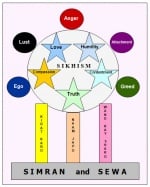Template:Did you know: Difference between revisions
From SikhiWiki
Jump to navigationJump to search
Hari singh (talk | contribs) No edit summary |
Hari singh (talk | contribs) No edit summary |
||
| Line 14: | Line 14: | ||
*.... that '''[[Bani]]''' ([[Punjabi]] {{pa|ਬਾਣੀ}}) is short for '''[[Gurbani]]''' (Punjabi {{pa|ਗਰਬਾਣੀ}}) and is the term used by [[Sikh]]s to refer to various sections of the [[Holy Text]] that appears in their several [[Holy Book]]s. These [[Bani]]s are often found in small [[Gutka]]s or Small Books containing sections of [[Gurbani]]. | *.... that '''[[Bani]]''' ([[Punjabi]] {{pa|ਬਾਣੀ}}) is short for '''[[Gurbani]]''' (Punjabi {{pa|ਗਰਬਾਣੀ}}) and is the term used by [[Sikh]]s to refer to various sections of the [[Holy Text]] that appears in their several [[Holy Book]]s. These [[Bani]]s are often found in small [[Gutka]]s or Small Books containing sections of [[Gurbani]]. | ||
*....that '''[[Anandpur Sahib]]''' ('''City of Bliss''') is one of the holiest places of the [[Sikh]]s, second only to [[Amritsar]]. | *....that '''[[Anandpur Sahib]]''' ('''City of Bliss''') is one of the holiest places of the [[Sikh]]s, second only to [[Amritsar]]. | ||
Revision as of 09:37, 8 May 2009
Did you know...
- .....that one of the five forts in Anandpur Sahib built by Guru Gobind Singh was called Keshgarh Fort.
- ..... that on the 5 January 2008, the Sikh worldwide will celebrate the 340th anniversary of the birth of Guru Gobind Singh.
- .....that Guru Ram Das ji was born at Chuna Mandi Bazaar, Lahore on 24th September 1534 and spent the first seven years of his life here and that his name before obtaining Guruship was Bhai Jetha which means the first born.
- ..... that it is every Sikh's duty to defeat the Five vices: Kam (Lust), Krodh (Rage), Lobh (Greed), Moh (Attachment) and Ahankar (Ego). Also that the Guru Granth Sahib gives clear warning about these five plundering you - read Guru Granth Sahib against lust on this issue.
- .... that Langar is a Sikh free kitchen which was started by the first Sikh Guru, Guru Nanak Dev Ji in the fifteenth century. It is designed to uphold the principle of equality between all people of the world regardless of their religion, caste, colour, creed, age, gender or social status. In addition to the ideals of equality, the tradition of Langar expresses the ethics of sharing, community, inclusiveness and oneness of all humankind. "..the Light of God is in all hearts", said Guru Nanak (sggs 282)
- .... that Bani (Punjabi (Punjabi: ਬਾਣੀ)) is short for Gurbani (Punjabi (Punjabi: ਗਰਬਾਣੀ)) and is the term used by Sikhs to refer to various sections of the Holy Text that appears in their several Holy Books. These Banis are often found in small Gutkas or Small Books containing sections of Gurbani.
- ....that Anandpur Sahib (City of Bliss) is one of the holiest places of the Sikhs, second only to Amritsar.

